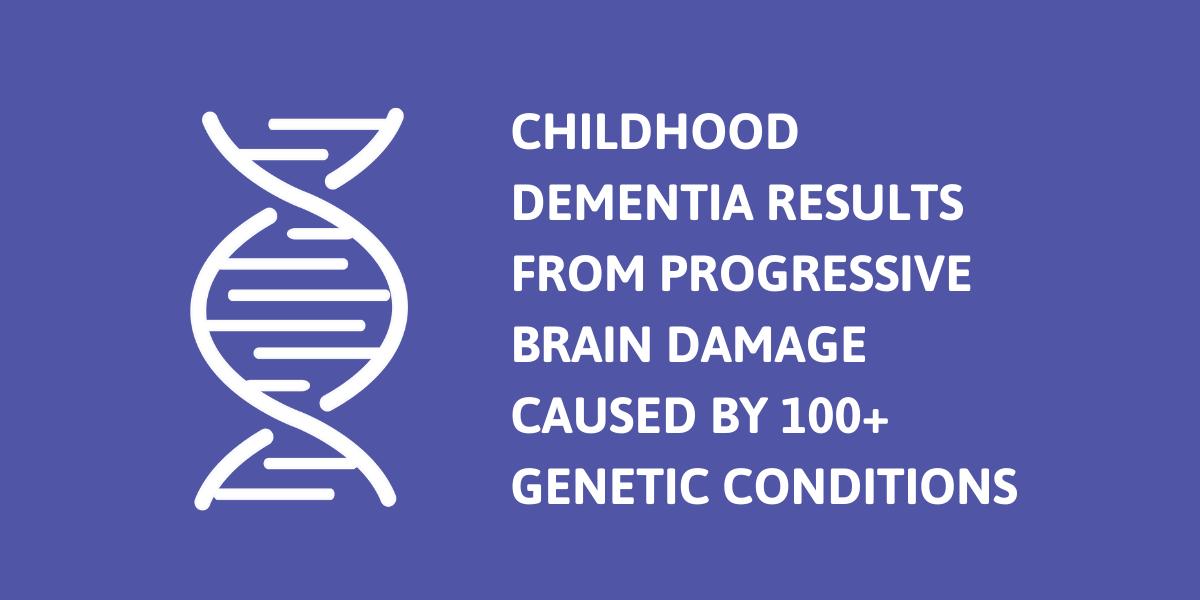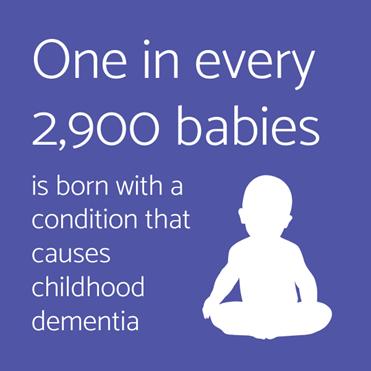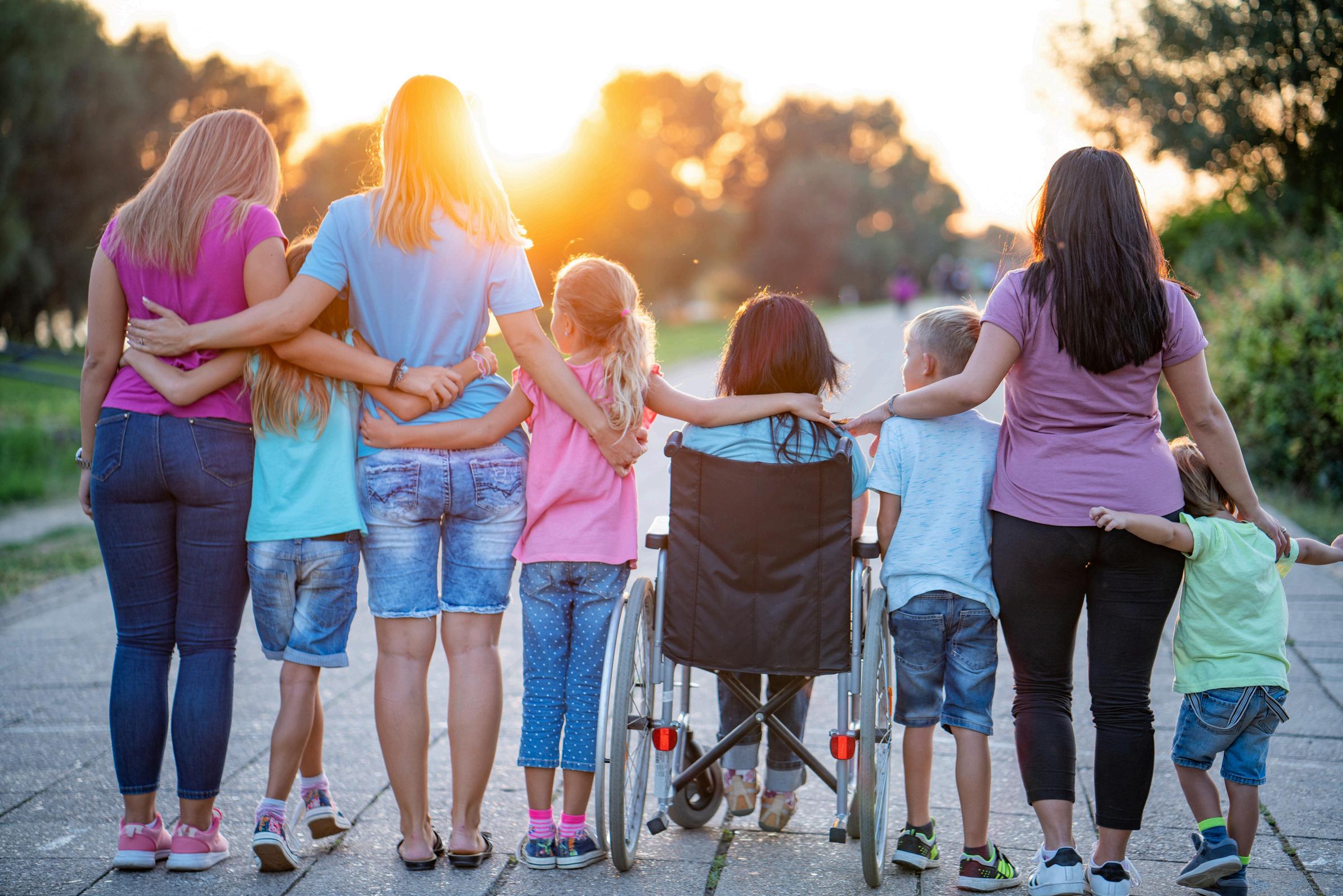
5 minute read
Childhood Dementia: A New Approach to 100+ Rare Genetic Neurodegenerative Conditions
by Isobel Lindley, Childhood Dementia Initiative
Dementia is commonly associated with aging and diseases such as Alzheimer’s, but it’s far less known that dementia can also affect children. Childhood dementia is not a single disease but rather a collective of over 100 rare genetic disorders that damage the brain and nervous system. These disorders are progressive and rob children of memory, language, motor skills, and independence, ultimately leading to premature death. An estimated 1 in every 2,900 babies is born with a childhood dementia condition.
As each individual disorder is rare, these conditions historically have received little attention or research, and the care and support needs of this cohort have remained largely unrecognized and without meaningful response.
In 2020, the Childhood Dementia Initiative was launched to drive collective action for all the disorders that fall under the childhood dementia umbrella. This approach is similar to that taken for cancers: bringing the many different cancers together resulted in significant awareness and improvements in survivorship and quality of life.

With attention on this cohort, emerging research is now revealing the significant psychosocial toll on families including isolation, pervasive and ongoing grief, anxiety, and financial impacts. Families report struggling to access adequate care and support while managing their children’s increasing and complex care needs. Delays in diagnosis, difficulties finding knowledgeable healthcare professionals, having to become the experts on their child’s condition, managing a complex web of specialists and appointments are among the identified challenges.
This new body of evidence is being used to create change. In Australia, the Federal government has partnered with Childhood Dementia Initiative to design better care and support for children and families. Additionally, researchers, families and health professionals have come together to advocate for change and work together. As action and awareness grows globally, progress for this cohort can finally accelerate and deliver the care, support, treatments and cures children with dementia urgently need.
Childhood Dementia: A New Approach to 100+ Rare Genetic Neurodegenerative Conditions cont'd
What is childhood dementia?
Childhood dementia results from progressive brain damage and is caused by over 100 rare genetic disorders.
The most common types of childhood dementia include Rett syndrome, some mitochondrial disorders, nonketotic hyperglycinemia, vanishing white matter disease, Sanfilippo syndrome, Batten disease, MECP2 duplication syndrome, spastic paraplegia type 11 and juvenile Huntingtons disease.

First signs and symptoms
Altogether, there are over 100 different childhood dementia disorders. They are all progressive, fatal genetic conditions.
Broadly, the different groups or types of childhood dementia disorders include:
Inborn errors of metabolism
Lysosomal disorders
Mitochondrial disorders
Mucopolysaccharidoses
Peroxisomal disease
Neurodegeneration with brain iron accumulation (NBIA)
Leukodystrophy
The first signs of childhood dementia are varied and can include seizures, developmental delays and developmental regression (loss of skills already learned). Childhood dementia symptoms start, on average, at 2.5 years of age. There is, however, a wide spectrum in ages for symptomonset depending on the type of childhood dementia. For some children, symptoms can appear when they're babies and progress quickly. While for others, symptoms may not appear until later in childhood or, rarely, during their teens.
Other early signs can include hearing and vision loss, speech delay, problems feeding, trouble controlling movement and behavioural problems. It’s common for children to remain undiagnosed for significant periods, and sometimes years, and to be misdiagnosed with autism, developmental delay, or attention deficit hyperactivity disorder (ADHD).

Childhood Dementia: A New Approach to 100+ Rare Genetic Neurodegenerative Conditions cont'd
In addition to these symptoms, children can also:
Suffer from seizures
Lose their vision and hearing
Lose their ability to move entirely
Have problems with their bones, joints, or their cardiovascular, respiratory, or digestive systems


New Resources: The Childhood Dementia Guide Supporting and Empowering Families
The Childhood Dementia Guide for Families is a collection of information resources for families impacted by childhood dementia. It was developed by the Childhood Dementia Initiative in collaboration with families. The Guide was designed to help families:
Understand and talk about childhood dementia
Manage healthcare appointments and enable better experiences with healthcare providers
Confidently stand up for their children's needs
Feel less isolated
The first phase of the Childhood Dementia Guide for Families is made up of two components: Information and guidance for families
Finding Hope: A letter from one parent to another. A message of support from a parent who shares personal insights and offers encouragement.
Understanding Your Child's Diagnosis: A guide for parents of children with childhood dementia conditions. A clear, straightforward explanation of childhood dementia to help parents make sense of their child's diagnosis.
Supporting a Family Affected by Childhood Dementia: A guide for grandparents, family members & close friends. A guide for grandparents, family members, and friends that explains childhood dementia in simple terms and provides practical ways to offer family support.
Childhood Dementia: A New Approach to 100+ Rare Genetic Neurodegenerative Conditions cont'd
Practical Healthcare Resources
Healthcare Rights Guide: For parents of children with a childhood dementia condition. This guide suggests practical ways to talk with healthcare providers and stand up for a child's needs. It includes practical tips about collecting important information, preparing for healthcare appointments, and question prompts.
About My Child: A one-page summary for new doctors. A summary form to share with a new doctor, giving them all the important details they need to know about a child.
Doctor Appointment Checklist: A comprehensive form to help parents prepare for, manage, and follow up on healthcare appointments. This resource captures essential information and helps parents ask important questions.
Easy Read Doctor Appointment Form: A simplified version of the Doctor Appointment Checklist with straightforward language and clear formatting to help track medical visits.


“This toolkit represents an important step toward our goal of improving outcomes for children with childhood dementia and supporting and empowering the families who care for them," says Gail Hilton, Head of Programs at Childhood Dementia Initiative.
“While Childhood Dementia Initiative is driving essential system improvements to reduce the burden on parents to advocate for their children, we’re aware that parents urgently need information and support now. Parents who have gained expertise through their lived experience have shared their learnings through this toolkit, which will help guide others as they navigate a childhood dementia diagnosis and their child’s ongoing care. Utilizing parents’ lived experiences is an effective and powerful way that we can give parents support now,” adds Hilton. For families: Information and a growing suite of support resources can be found at: https://www.childhooddementia.org/families-and-carers
Information for health professionals, including the Childhood Dementia Community of Practice, can be found at: https://www.childhooddementia.org/health-professionals
If you are a researcher focused on childhood dementia or with an interest in childhood dementia, connect with the Childhood Dementia Initiative here: https://www.childhooddementia.org/for-researchers
To raise awareness, join the colourful global awareness push on Childhood Dementia Day 17 September https://www.childhooddementia.org/faceit
Childhood Dementia: A New Approach to 100+ Rare Genetic Neurodegenerative Conditions cont'd
Support Systems in Canada
While the rarity of childhood dementia means there are limited disease-specific services, several organizations and community supports exist to assist families.
1. Rare Disease Foundations and Advocacy Groups
Rare Diseases Canada (https://raredisorders.ca)
Offers support for families living with rare disorders, including guidance, resources, and advocacy.
Canadian Organization for Rare Disorders (CORD)
Advocates for policy change, research funding, and access to orphan drugs and clinical trials. Childhood Dementia Initiative (CDI) (Australia-based but global in scope –https://www.childhooddementia.org)
Raises awareness and offers downloadable family support guides, even for Canadian audiences.
2. Condition-Specific Organizations
Sanfilippo Children’s Foundation Canada (https://www.alifeforellie.ca)
Provides education, family networking, and research support.
CLIMB Foundation Canada (https://www.climbcanada.org)
Supports families with Batten disease and similar lysosomal storage disorders. The Isaac Foundation (https://www.theisaacfoundation.com)
Supports families with rare lysosomal diseases like MPS.
Rett Syndrome Association of Canada (https://www.rett.ca)
Offers family resources, community networking, and advocacy for affected girls and their families.
3. Community-Based Supports
Children’s Treatment Centres (Ontario and across provinces)
Provide developmental therapy, speech therapy, occupational therapy, and physical therapy for medically complex children.
Canuck Place Children’s Hospice (BC) & Roger Neilson House (Ottawa)
Pediatric palliative care centers that support children with life-limiting illnesses.
Respite Services and Home and Community Care Support Services (by province)
Offer respite care, home nursing, and case coordination for medically fragile children.

Childhood Dementia Initiative
An organization that transforms the response to childhood dementia. They drive change within systems responsible for the treatment and care of children. They bring all of the conditions that cause childhood dementia together under one umbrella.
https://www.childhooddementia.org/










